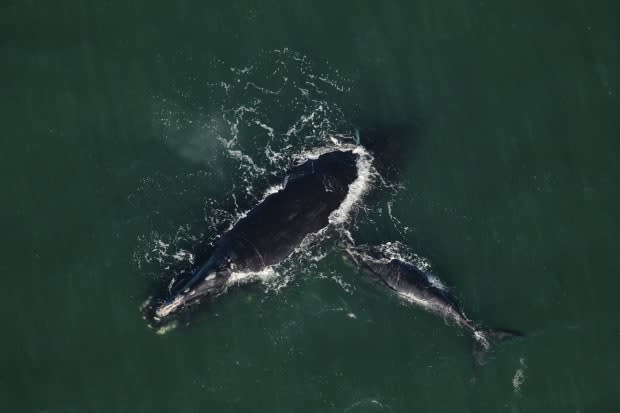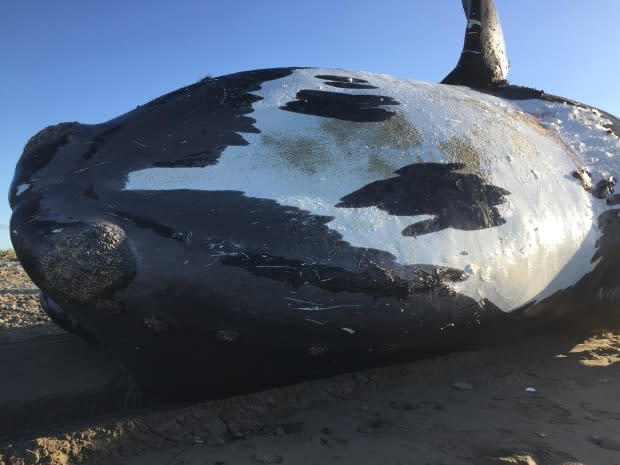Entangled right whale 'unable to close her mouth for months'
Researchers have discovered an entangled female North Atlantic right whale off the Massachusetts coast, underscoring calls for less harmful fishing gear.
The news comes one day after Ottawa announced new measures to protect the endangered species. About 400 right whales remain, with only 100 breeding females.
The entangled right whale, named Dragon, was spotted on Feb. 24 with a buoy lodged into the right side of her mouth, according to the New England Aquarium.
"She is extremely emaciated and gray, suggesting she may have been entangled and unable to close her mouth for months," said senior scientist Amy Knowlton in a release.
The aquarium said the potential loss of mother is "particularly devastation to the species."
Dragon was photographed during an aerial survey south of Nantucket.
Optimism around new rules
Meanwhile, scientists and fisherman remain optimistic about the Canadian government's announcement, which included more protections to prevent future entanglements in fishing gear.
Robert Haché, a snow crab fisherman and representative for Acadian Crabbers' Association, said the announcement was one of the best he's heard since 2017 — a year with one of the highest rates of mortality for right whales in recent memory.

"It is a good balance in terms of trying to protect the fisheries ... and also protect the well-being of the whales," Haché said.
Last year, there eight confirmed North Atlantic right whales deaths in Canadian waters. Twenty-nine right whales have been killed, largely by collisions or entanglement in fishing gear, in Canadian waters since 2017.
Fisheries and Oceans Canada will close fishing in areas of the Gulf of St. Lawrence where whales are gathering in large numbers from April to November this year.

A fishing zone will be closed until the end of the season, Nov. 15, if whales are detected in an that area of the gulf more than once during a 15-day period. Before, the zone would have re-opened after 15 days.
The fishing closures extend to the Bay of Fundy as well.
"We don't want to kill whales and we know that the fishery will have a hard time to survive unless we provide space for the well-being of those animals," Haché said.
Fisheries will also have to mark their gear, identifying the country, region and fishery its from in order to help trace the gear after an entanglement.
The government also kept the speed limit in the western part of the Gulf of St. Lawrence at 10 knots for the 2020 season.
Further speed restrictions were also introduced for parts of Northern New Brunswick and Cape Breton, including the Shediac Valley Area of Interest and the Cabot Strait.
The government also adjusted the fishing season, allowing fishers to get on the water earlier this year.
Haché said he doesn't expect the changes to effect on the harvesting quota this year.
"I expect that it's going to be better because of the fact that we can fish early," he said.
Biologist wants a Plan B
Sean Brillant, a senior conservation biologist with the Canadian Wildlife Federation, said the measures look good on paper, but he's not sure if they will actually prevent whale deaths this year.
"We see an evolution of these measures [from last year] and incorporation of new science and new information," Brillant said.
"The difficulty is it ultimately comes down to if it's going to work or not."
Brillant would like the government to have a Plan B, in case this year's measures aren't enough to protect the endangered species.
"I want to know what we're going to do when we find that first whale or that second whale or third whale that is dead and tangled or floating in the Gulf of St. Lawrence," he said.

Brillant said scientists, fisherman and the government should know by early summer whether the new measurements are effective, as most whales in past years have been killed in June and July.
"To me, it seems like we're making a good decision so far, but I'm going to wait and see what happens," he said.
The New England Aquarium's Anderson Cabot Center for Ocean Life said it feels encouraged by the Canadian government's new measures.
In a news release, the research centre said there is a possibility right whales could still be struck by some smaller vessels that don't have to obey the new measures, however.
Still, it applauded the government supporting the testing of ropeless fishing gear and bringing in ice breakers to clear harbours so fisheries can open sooner.
"Saving right whales from extinction will take strong initiative from both the Canadian and US governments to develop and implement regulations that are focused on the whales but also cognizant of the industries that work in their realm," said the New England Aquarium's release.


